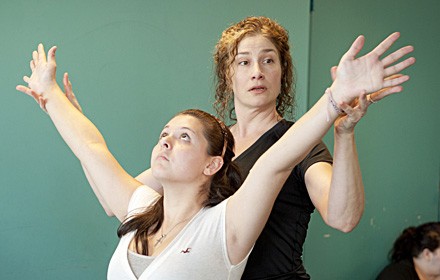Melissa Owens: Theatre, Kindness, and the Chekhov Method

For all her experience in theater – nearly three decades’ acting and teaching all over the country and beyond – Melissa Owens is one low-drama mama. Owens, who begins her second year as Converse faculty this fall, subscribes to a lesser-known method of acting, the Chekhov system, which relies on imagination and, in her own word, kindness.
The single mother, whose 12-year-old daughter, Mary, was the one to suggest she pursue the position she now holds at Converse, was previously employed at Kent State University. It’s there that she learned and started teaching the acting method that, she says, fits her like her own skin. She also happens to be one of only a few certified Chekhov instructors in the country. Michael Chekhov, nephew of iconic Russian playwright Anton Chekhov, developed the thespian-training technique during the first half of the last century. He spun his psychophysical methodology from his mentor, the legendary Constantin Stanislavski, from whose “System” sprung the American “Method”; Method actors include Denzel Washington, Johnny Depp and Marlon Brando. Actors known strictly as Chekhov types include Clint Eastwood and the late Yul Brynner, the legendary lead of The King & I.
“I’ve always felt that my acting philosophy is my living philosophy, and, of course, it would have to be my teaching philosophy. There’s a kindness to the Chekhov methodology.”
The differences between Chekhov’s system and that of his mentor Stanislavski, in a nutshell, have to do with how an actor approaches a role. Stanislavski insisted that an actor analyze the script and the character before making choices about how to behave on stage. “Chekhov,” she explains, “believed that students should also incorporate the imagination and body, in addition to the intellect, using psychophysical studio exercises such as Qualities of Movement, Ideal Center, Radiating/Receiving, Atmosphere and Psychological Gestures, all done in a spirit of artistic collaboration in a supportive Ensemble.”
Owens likes to point out that Chekhov “eschews the ego part” – in a field where huge egos seem to be de rigueur. And that’s part of what the mild-mannered, even soft-spoken professor says attracts her to Chekhov. “I’ve always felt that my acting philosophy is my living philosophy, and, of course, it would have to be my teaching philosophy. I couldn’t separate those things. There’s a kindness to the Chekhov methodology.” You can feel a visceral, if almost otherworldly, kindness in Owens’ voice. Valerie Barnet says the same thing.
The Spartanburg Day School drama teacher acted alongside other Converse students under Owens’ direction in the college’s April production of Dancing in Lughnasa. (The play had been made into a 1998 film starring Meryl Streep.) “She is calm and respectful when she works with the students, as she simultaneously expects hard work and dedication from them,” Barnet says of Owens. “They adore her and want to please her.”
“She is calm and respectful when she works with students. They adore her and want to please her.”
Owens has certainly earned that level of respect. She’s appeared on TV (ABC, to be precise) and has acted in award-winning turns on boards from the Kennedy Center to Frankfurt, Germany, from Hilton Head, SC, to Cleveland, and multiple venues in between. She has performed in nearly 75 productions, from Hamlet to Caucasian Chalk Circle, and has sung and danced in musicals such as Chicago and A Chorus Line. She owns a Master of Fine Arts degree in Acting from Kent State and a Master’s in Theatre/Costume Design from Miami University, also in the Buckeye State. Now she holds an impressive title at Converse: Assistant Professor of Acting & Movement and Costumes in the Department of Theatre and Dance.
For an actor who has been teaching for so long and who first starred as “Mrs. Chicken” in third grade in her Syracuse, NY, hometown, you’d think she’d be Broadway bound. But, no, she says she never found the bright-lights, big-city fame all that appealing. “I’m very one-on-one. I like playing a smaller house better than a big house. It was just never interesting to me to be famous, the work was more important to me. Broadway is a goal, not a process, and it just wasn’t one of my goals.” In that sense, she and Converse are as tight a fit as the one she feels with Chekhov’s system.
“…You come away from her like you’ve had a deep conversation.”
Kevin DeLapp, chairman of the college’s Philosophy Department and a member of the search committee that hired her, says: “When she first visited campus, she interacted with Converse, and at a place like this, that’s everything. … She’s very pleasant, and you come away from her like you’ve had a deep conversation. In a field like theater, that’s essential, and students are really responsive to her – and we were, too.” In a word, she’s just low-drama. “You know how sometimes people say, ‘Oh, my god, I hate theater people!’? When you’re in a room with Chekhov people,” she says, “you don’t even know you’re in a room with theater people, unless they start talking about theater, of course.”
After all, she’s all about imagination and ensemble: the ego-free Chekhov system at work. “There is no art without joy,” she says, quoting Michael Chekhov. And for now, the rising-second-year Converse theater professor sounds like she’s playing the happiest role of her life.